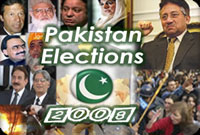U.S. position on Pak polls will determine future bilateral ties: Expert
 Washington, Feb. 20: It is critical that the United States is seen as taking an objective and impartial view of the elections in Pakistan based on its assessment of the fairness of the process as reported by election observers, an expert on South Asian affairs has said.
Washington, Feb. 20: It is critical that the United States is seen as taking an objective and impartial view of the elections in Pakistan based on its assessment of the fairness of the process as reported by election observers, an expert on South Asian affairs has said.
In an article, Lisa Curtis, a senior research fellow in the Asian Studies Center at The Heritage Foundation, believes the U. S. position on these historic elections will reverberate for some time to come on the overall quality of the U. S.-Pakistan relationship.
“The U. S. must begin to view Musharraf as a transitional figure and be ready to deal with a more broad-based civilian government in Pakistan,” she adds.
Lauding the decision of Pakistanis to turn out in decent numbers to vote in the elections despite security and rigging fears, Curtis said the election will help to end a year of political instability and put Pakistan on the path toward civilian-led rule, even as the al-Qaeda works to destabilize the state through suicide bombings that have killed over
800 people in the past six months.
She says that Washington should be prepared to work with the new civilian government and recognize that President Pervez Musharraf's role in governing the country is likely to diminish as a new civilian government finds its footing.
The determination of Pakistanis to participate in a democratic process is a clear signal to extremist outfits that they should exit from the country sooner than later.
“The absence of large-scale extremist violence on the day of the polling was a victory for Pakistan's security forces,” Curtis claims in her article.
“Expected success by the secular Pashtun Awami National Party over the pro-Taliban Jamaat-i-Ulema-Islam (JUI), which has ruled the Northwest Frontier Province
(NWFP) since 2002, also demonstrates Pakistani voters' opposition to recent attempts by Taliban-backed militants to spread strict Islamic edicts in some parts of the NWFP,” she adds.
If the election brings to power a PPP-led coalition that includes Nawaz Sharif's party, President Musharraf's standing could weaken considerably, she opines.
PPP Co-Chairman Asif Zardari has indicated that he would pursue a unity government and has not ruled out working with Musharraf.
However, major wins by Sharif's party increases his political bargaining power and the likelihood that he will press for steps, such as calling for the reinstatement of the deposed judges, that would eventually lead to the ouster of Musharraf.
“If the independent judges return to the bench, they will likely rule against the legitimacy of Musharraf's presidency, forcing him to resign and possibly even face charges of treason,” Curtis says.
Pakistan's ability to overcome the challenge from religious extremists will be a significant determinant of the ultimate outcome of the struggle against al-Qaeda-inspired global terrorism.
Pakistan, Curtis says, has undergone dramatic changes in the past year, with civil society raising its voice and Musharraf relying increasingly on repressive measures to maintain his grip on power.
U. S. officials may view Musharraf as the glue that holds Pakistan together, but a growing number of Pakistanis view him as a source of instability.
“This disconnect between U. S. policymakers and the broader Pakistani public threatens to further erode Pakistani support for ties with the U. S., especially if Washington is seen as clinging to Musharraf when his party has been largely rejected at the polls, Curtis concludes. (ANI)